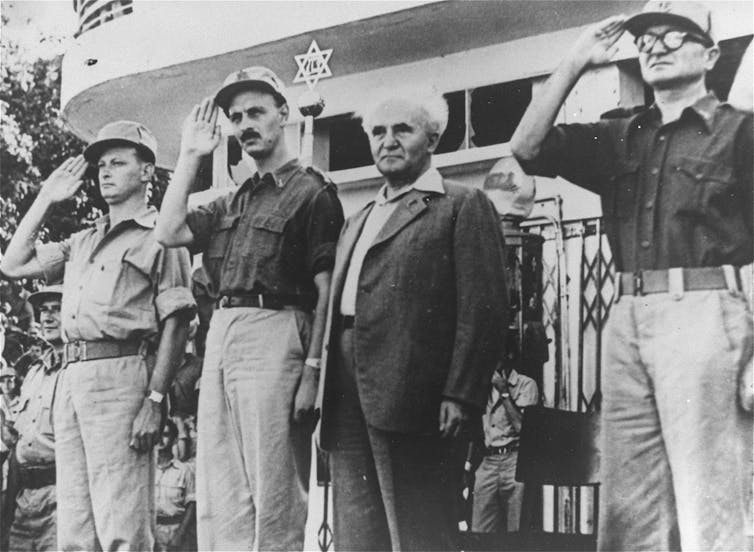By Avner Cohen
Living for 75 years within a hostile neighborhood has required the State of Israel to provide security against external threats to all its citizens.
That responsibility is a social contract between citizens and the State: The State is obligated to provide security for its people, especially those who live near its borders, that makes living there safe. In return, young Israelis must serve in the army.
That unwritten contract was abruptly shattered for Israelis in the morning hours of Oct. 7, 2023. And with it, the very premise and promise that led to the establishment of the State was suddenly put in doubt.
That Saturday, when a surprise assault by Hamas stunned Israel, has been recognized as a date that will live in infamy – recalling U.S. President Franklin D. Roosevelt’s memorable words about Dec. 7, 1941, when the Japanese bombed Pearl Harbor – in the annals of the State of Israel, indeed even in the annals of much older Jewish history.
Over 1,300 Israelis lost their lives in acts of mass killing on that day, mostly civilians. They were all murdered – executed, slaughtered, tortured, burned – by Hamas terrorists who launched a pogrom-like onslaught on Israeli villages on a scale never seen before. About 150 people, mostly Israeli civilians, were brutally kidnapped on that day by the attackers.
I am an Israeli historian, specializing in Israel’s nuclear history. I believe that to recognize the full meaning of Oct. 7, for Israel and Israelis, it must be placed in historical perspective, both Israeli and Jewish. There are other perspectives, including historical ones, but this essay is an attempt to portray the events of Oct. 7 – and their profound significance – as Israelis experienced them.

‘Never again’ was the state’s promise
Almost every Israeli citizen now is only one degree of separation from the victims of Oct. 7, 2023. For Israel, this is truly a national calamity in Biblical terms.
During the Holocaust, the Nazi killing machine executed thousands of Jews every day for years. But since then, there has never been a day in the 75 years of Israeli history that such a large number of Jews were killed, including the most horrific days of the 1973 Yom Kippur War.
Zionism as a national-political movement to establish a Jewish homeland came into being due to the pogroms – violent, usually murderous attacks in Europe – and the antisemitism of the late 19th century. By 1939, nobody could tell whether Zionism would succeed or fail. But it was the Shoah – Hebrew for “Holocaust” – that decisively unleashed the impetus among the Jewish people and internationally to create the state of Israel as a Jewish state, which stood as the triumph of Zionism.
The raison d’être – the purpose, justification, and international legitimacy – of the creation of Israel in 1948 was that it would be a safe homeland for the Jews as a fundamental response to the lesson of the Holocaust: Jews should no longer be victims.
So Israel came into being along with the national avowal “Never Again,” made by both the survivors and their rescuers, as its founding ethos. For Israelis and their supporters around the world, the triumph of Israel is the extraordinary transformation from Holocaust to national revival or, in Hebrew, from Shoah to Tekuma.
Over its life as a new state, Israel has built itself as a blend of the pen and the sword. On the sword side, Israel is the region’s military powerhouse. On the pen side, Israel has become a cultural force both within and beyond its borders, a hub of academic excellence and perhaps most known as a “startup nation,” a center of high-tech innovation.

Government fails its part of the contract
By now it is clear that the multi-faceted surprise Hamas onslaught – by sea, air and land – along the entire 40-mile long Gaza barrier demonstrated the colossal failure of all elements of the vaunted Israeli defense systems, including intelligence collection and warning, military deployment and readiness, command and control systems.
Indeed, Israeli military planners never even considered such an all-out attack as a worst-case scenario, as now openly acknowledged by former senior military officials.
Israel’s supposedly formidable border wall – a ground barrier that cost over a billion dollars and was completed in 2021 – was rendered useless almost instantly. Within minutes, the attackers overwhelmed some 30 sites on the other side of it – civilian settlements, military bases and even an outdoor concert site.
There were almost no Israeli troops deployed in the area in the first place to defend the many points of attack, in part due to the holiday and lack of advanced warning, and in part due to the complacent confidence in the wall and its high-tech support system.
Furthermore, since almost all military communication was cut off by Hamas knocking out the communication towers, Israeli military and political leaders for hours had only a vague idea of the unfolding calamity.
That colossal military failure reminded many Israelis of the dismal shock the country experienced in the 1973 Yom Kippur war. The resemblance seems obvious – then and now, Israelis witnessed catastrophic intelligence and operational blunders that cost so many lives due to complacency and arrogance.
But in some key respects, the catastrophe in 2023 seems even more traumatic – it shakes the very foundations of Israel as the embodiment of Zionism, a safe Jewish homeland. In 1973, the casualties of the blunder were almost all soldiers; the civilians were kept far from the fighting and safe.
Yet on Oct. 7, this was not the case.
‘We are being slaughtered’
If the founding commitment of the state to its citizens was “Never again,” the brutal new reality that emerged on Oct. 7 was “Never before.”
For long hours on that day, countless Israeli civilians were crying for help that in too many cases didn’t arrive in time. Never before in Israeli history had so many civilians been left for so long without the help of the army.
“We are being slaughtered. There is no army. It has been six hours,” one kibbutz resident said in desperation. “People are begging for their lives.”
Never before had Israelis found themselves whispering desperately to TV studios and social media, not knowing who else to call, while terrorists were inside their houses.
Now, Israel has mobilized the largest reserve army it has ever amassed – a response that reflects its attempt to re-commit to the idea, and the reality, of never again being so vulnerable.
Yet this national trauma will be reckoned for in generations to come. How could such a calamity happen? Who is responsible for such a catastrophe? How is it possible that a powerful nation was so complacent?
The official Israeli response to those soul-searching questions is that for now the nation must wage war and those questions must and will be thoroughly studied. But, they say, not now. Investigate this later, after the war is won.
Yet those questions are simmering and boiling within the Israeli psyche; it is impossible to resist them. There is clarity and confidence that once the war is over, professional and judicial investigations will be thoroughly conducted, but some have already accepted moral responsibility. This movement toward both demanding and accepting responsibility demonstrates a renewed faith among Israelis about the future for their country.
Most prominently, the Israeli military’s chief of staff, Lt. Gen. Herzi Halevi, has acknowledged publicly the failure of the army and took responsibility for that failure to provide security to the citizens of Israel.
The sole Israeli national figure who has acknowledged nothing about responsibility is the one on whose watch it all happened, Prime Minister Benjamin Netanyahu. Indeed, except for a few taped statements, in the week after the war began, Netanyahu has avoided meeting members of the public as well as taking questions from the press.
The rage against Netanyahu in the Israeli public is mounting.
The above, written by Avner Cohen (Professor of Nonproliferation Studies, Middlebury Institute of International Studies) was first published in The Conversation





